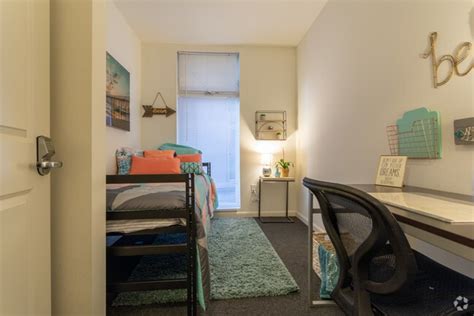Introduction

Finding suitable and affordable housing near campus is a crucial aspect of the Temple University experience. With a diverse student body and a thriving surrounding community, Temple University offers a wide range of housing options to meet the needs of its students. This guide will provide comprehensive information on the available housing options, including on-campus residence halls, off-campus apartments, and private rentals, empowering students to make informed choices that fit their budget, lifestyle, and academic pursuits.
On-Campus Housing: A Close-Knit Community Experience
Temple University’s on-campus residence halls offer a unique and immersive living experience that fosters community spirit and academic success. These halls provide a range of room types and amenities, including shared and private rooms, study lounges, recreation spaces, and dining halls.
Benefits of On-Campus Housing:
- Convenient location within walking distance to classes, libraries, and dining facilities
- Built-in social opportunities and a sense of community among residents
- Access to on-campus amenities such as fitness centers, laundry facilities, and study spaces
- Meal plans that cater to diverse dietary needs and budgets
Off-Campus Housing: Flexibility and Independence
Off-campus housing options offer students greater flexibility and independence. Apartments and private rentals provide more living space, privacy, and the ability to customize their living environment.
Types of Off-Campus Housing:
- Apartments: A popular choice for students seeking multiple bedrooms, shared common areas, and kitchen facilities.
- Private Rentals: Independent houses or apartments rented directly from landlords, offering more privacy and potentially lower costs.
Benefits of Off-Campus Housing:
- Increased living space and privacy
- Control over the rental agreement and living arrangements
- Cost savings compared to on-campus housing
Common Mistakes to Avoid in Off-Campus Housing:
- Signing a lease without thoroughly inspecting the property: Ensure the unit meets your expectations and any repairs or issues are addressed before signing a contract.
- Overlooking safety precautions: Choose a location with adequate lighting, security features, and proximity to emergency services.
- Ignoring neighborhood characteristics: Research the surrounding community to ensure it aligns with your lifestyle and preferences.
Cost and Availability of Housing Options
The cost of housing varies depending on the type of accommodation, location, and amenities. On-campus residence halls typically range from $9,000 to $15,000 per academic year, while off-campus apartments typically cost between $1,000 and $2,500 per month.
Availability of housing options can fluctuate based on factors such as student enrollment, graduation rates, and the local housing market.
Why Housing Matters for Student Success
Housing is more than just a place to live; it plays a significant role in student academic performance and well-being.
Academic Benefits:
- Convenient access to campus resources promotes academic engagement
- Quiet study spaces and supportive environment enhance concentration
- On-campus resident advisors provide academic guidance and support
Personal Development Benefits:
- Promotes independence and responsibility
- Fosters social connections and a sense of community
- Develops life skills such as budgeting, time management, and conflict resolution
How to Secure Housing
On-Campus Housing:
- Apply for on-campus housing through the university’s housing portal
- Submit a housing application and application fee
- Meet the housing application deadline
Off-Campus Housing:
- Begin the search early (4-6 months in advance)
- Network with other students, friends, and family for leads
- Attend off-campus housing fairs and consult with University Housing Services
- Thoroughly research neighborhoods, transportation options, and potential roommates
Conclusion
Finding suitable housing near Temple University is essential for a successful and fulfilling student experience. By carefully considering the available options, weighing the benefits and costs, and addressing common pitfalls, students can make informed choices that meet their individual needs. On-campus residence halls provide a close-knit community experience and academic support, while off-campus housing offers flexibility and independence. Ultimately, the best housing decision depends on the student’s lifestyle, budget, and academic goals.
